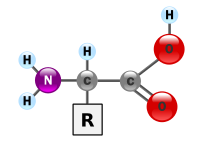
Photo from wikipedia
Dairy contributes to daily protein and provides important minerals and vitamins. Using data of the National Nutrition Survey in Switzerland (menuCH), we aimed to describe intakes of dairy and its… Click to show full abstract
Dairy contributes to daily protein and provides important minerals and vitamins. Using data of the National Nutrition Survey in Switzerland (menuCH), we aimed to describe intakes of dairy and its subcategories, to compare daily and per-meal dairy protein with total protein intake, and to investigate associations between energy-standardized dairy intake and sociodemographic, lifestyle and anthropometric factors. From two 24-h dietary recalls, anthropometric measurements, and a lifestyle questionnaire from a representative sample (n = 2057, 18–75 years), we calculated daily and energy-standardized means and standard error of the means for dairy, its subcategories (milk, yoghurt and cheese), and compared daily and per-meal dairy protein with total protein intake. Associations were investigated between dairy intake (g/1000 kcal) and sociodemographic, lifestyle and anthropometric factors by multivariable linear regression. Dairy intake provided 16.3 g/day protein with cheese contributing highest amounts (9.9 g/day). Dairy protein intake was highest at dinner (6.3 g/day) followed by breakfast, lunch and snacks (4.3, 3.3 and 2.4 g/day, respectively). Per meal, total protein reached the amounts suggested for improving protein synthesis only at dinner and lunch (33.1 and 28.3 g/day, respectively). Energy-standardized dairy intake was 20.7 g/1000 kcal higher for women than men (95% CI 13.2; 28.1), 24.3 g/1000 kcal lower in the French than German-speaking region (95% CI − 32.4; − 16.1), and also significantly associated with nationality, household type and smoking status. This first description of dairy consumption is an important basis for developing meal-specific recommendations, aimed to optimize dairy and protein intake especially for older adults.
Journal Title: European Journal of Nutrition
Year Published: 2020
Link to full text (if available)
Share on Social Media: Sign Up to like & get
recommendations!